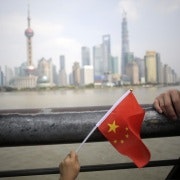Free trade with China, a dangerous deal?
Prime Minister Tony Abbott says he is confident of securing a free-trade agreement with China within 12 months. “It's time to sign the agreement,” insisted Ian Macfarlane, Minister for Industry, at a meeting in Tianjin, China. The Coalition government hopes that Abbot’s first visit to China, tentatively set for May or June next year, will feature a concluded FTA.
The Liberals face stiff resistance from their coalition partners, the National Party, which insists that restrictions on Chinese investment should be increased, not reduced. The Nationals’ resistance echoes popular concerns over Chinese investment.
The 2013 Lowy Institute poll found that fifty-seven per cent of Australians believe that the Australian Government already allows too much investment from China. While three in four Australians believe China is the most important economy to Australia, a significant minority (41 percent) still see China as a likely military threat within the next two decades.
These trends reflect deepening anxiety that China will use its economic leverage over Australia for strategic purposes – what scholars call economic statecraft.
China’s economic statecraft poses two potential challenges for Australia. First, as Australia’s largest trading partner, China could potentially hold Australian exports hostage to political demands, such as Australia’s military cooperation with the United States or our interactions with Taiwan.
In fact, Australia enjoys considerable economic leverage over China. As Prime Minister Kevin Rudd reminded Parliament in 2011 – ‘In quality, price and proximity, the iron ore Australia provides to China is without peer, and not easily replaceable elsewhere on the world market.’ Australia is China’s top source for mineral ores and coal, its second-largest source of liquid natural gas, and sixth largest source of fuels overall. Australia, along with Brazil, dominates the global iron ore export market.
Even when Australia-China relations fell to a generational low in 2009, China restrained from using the economic lever, and Australian exports to China continued to accelerate. Now that Beijing is struggling to avoid the ‘middle income trap’ by transitioning into a demand-driven, high-value economy, blocking its own access to key strategic inputs is even more unlikely, particularly amidst lingering global uncertainty.
Second, China might manipulate its investments in Australia for strategic purposes. Yet even here Australia’s exposure is limited. While Australia is the single-largest recipient of China’s foreign direct investment (FDI), China is only the ninth largest source of accumulated FDI for Australia, holding only three per cent of all direct investment stock in Australia.
Nationals senator John Williams’ demand that Australian farmland not be sold off “en masse” to the Chinese is particularly misplaced. In 2012, ninety per cent of Chinese investment in Australia went into mining or gas projects; only three per cent went to agriculture.
Moreover, the Australian government has acted decisively when Chinese investments raise national security concerns. In 2009, China Minmetals was blocked from purchasing an iron ore mine near an Australian Defence facility. Both Labor and Coalition governments have rejected bids by the Chinese private firm Huawei to invest in Australia’s national broadband network
As recent history has shown, expanding trade and investment with China is good for Australian prosperity and therefore strengthens Australia’s national security. The Australian government must continue to exercise due diligence in assessing investment arrangements. However, fears that the Chinese government will manipulate its trade and investment to undermine Australian autonomy or security are overblown.
Both sides need to do a better job of explaining this reality to the Australian public. Chinese diplomats should explain what exactly a state-owned enterprise is, and directly address Australian concerns over political manipulation. Pointing to China’s considerable track record of investing in Australia would be a good start. The Abbot government, if it wishes to get a trade deal with China within the year, will also have to work harder to address popular concerns.
Economic statecraft is an important tool of Chinese foreign policy, worthy of serious and sustained attention; but it should not be used as an excuse for opposing economic engagement with China.
James Reilly is a Senior Lecturer at the University of Sydney. He is the author of a Lowy Institute for International Policy Analysis ‘China’s Economic Statecraft – turning wealth into power’.
















